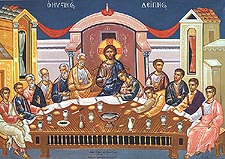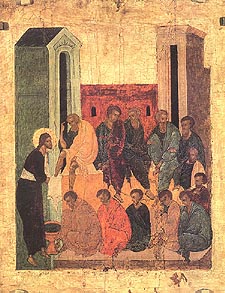Holy Thursday

The vigil on the eve of Holy Thursday is dedicated exclusively to the Passover Supper which Christ celebrated with his twelve apostles. The main theme of the day is the meal itself at which Christ commanded that the Passover of the New Covenant be eaten in remembrance of Himself, of His body broken and His blood shed for the remission of sins. In addition, Judas’ betrayal and Christ’s washing of His disciples feet is also central to the liturgical commemoration of the day.
In cathedral churches it is the custom for the bishop to re-enact the foot washing in a special ceremony following the Divine Liturgy. At the vigil of Holy Thursday, the Gospel of Saint Luke about the Lord’s Supper is read. At the Divine Liturgy the Gospel is a composite of all the evangelists’ accounts of the same event. The hymns and the readings of the day also all refer to the same central mystery.

When Thy glorious disciples were enlightened at the washing of their feet before the supper, then the impious Judas was darkened by the disease of avarice, and to the lawless judges he betrayed Thee, the Righteous Judge. Behold, O lover of money, this man because of avarice hanged himself. Flee from the insatiable desire which dared such things against the Master! O Lord who deals righteously with all, glory to Thee (Troparion of Holy Thursday).
In the regions of the Master, at the Table of Immortality, in the high place, with minds lifted up, come, O ye faithful, let us eat with delight (Ninth Ode of the Canon of Matins).
The Divine Liturgy of Saint Basil is served on Holy Thursday in connection with Vespers. The long gospel of the Last Supper is read following the readings from Exodus, Job, Isaiah and the first letter of the Apostle Paul to the Corinthians (1 Cor 11). The following hymn replaces the Cherubic Hymn of the offertory of the liturgy, and serves as well as the Communion and Post-Communion Hymns.
Of Thy mystical supper, O Son of God, accept me today a communicant, for I will not speak of Thy mystery to thine enemies, neither like Judas will I give Thee a kiss, but like the thief will I confess Thee: Remember me, O Lord, in Thy kingdom.
The liturgical celebration of the Lord’s Supper on Holy Thursday is not merely the annual remembrance of the institution of the sacrament of Holy Communion. Indeed the very event of the Passover Meal itself was not merely the last-minute action by the Lord to “institute” the central sacrament of the Christian Faith before His passion and death. On the contrary, the entire mission of Christ, and indeed the very purpose for the creation of the world in the first place, is so that God’s beloved creature, made in His own divine image and likeness, could be in the most intimate communion with Him for eternity, sitting at table with Him, eating and drinking in His unending kingdom. Thus, Christ the Son of God speaks to His apostles at the supper, and to all men who hear His words and believe in Him and the Father who sent Him:
Fear not, little flock, it is Your Father’s good pleasure to give you the kingdom (Lk 12.32).
You are those who have continued with Me in My trials; as My Father appointed a Kingdom for Me, so do I appoint for you that you may eat and drink at My table in My Kingdom . . . (Lk 22.28–31).
In a real sense, therefore, it is true to say that the body broken and the blood spilled spoken of by Christ at His last supper with the disciples was not merely an anticipation and preview of what was yet to come; but that what was yet to come—the cross, the tomb, the resurrection on the third day, the ascension into heaven—came to pass precisely so that men could be blessed by God to be in holy communion with him forever, eating and drinking at the mystical table of His kingdom of which there will be no end.
Thus the “Mystical Supper of the Son of God” which is continually celebrated in the Divine Liturgy of the Christian Church, is the very essence of what life in God’s Kingdom will be for eternity.
Blessed is he who shall eat bread in the Kingdom of God (Lk 14.15).
Blessed are those who are invited to the Marriage Supper of the Lamb (Rev 19.9).
